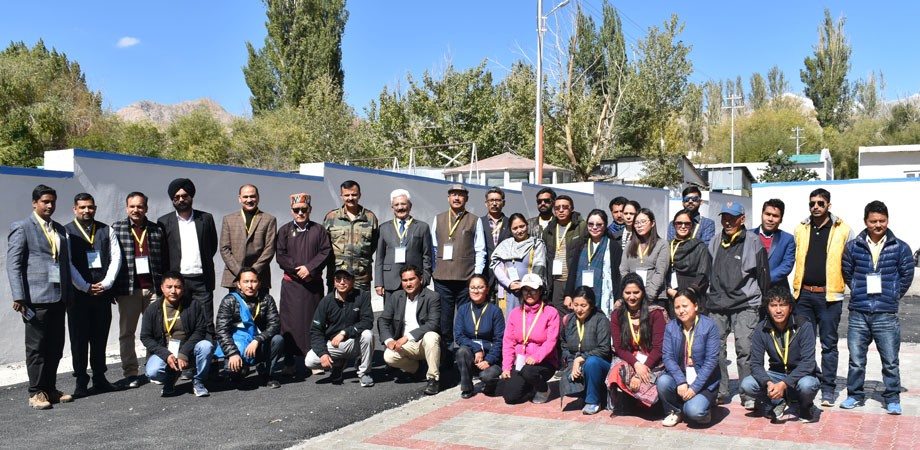Workshop on promoting medicinal and aromatic plant concluded in Leh

A two-day workshop-cum-brainstorming programme on ‘Promoting Medicinal and Aromatic Plant (MAP) Sector for Conservation of Snow Leopard Habitats in the Himalaya’ concluded on October 15 at DIHAR, DRDO, Leh.
The programme was organized by G.B. Pant National Institute of Himalayan Environment & Sustainable Development (GBPNIHESD), Kosi-Katarmal, Almora, Uttarakhand and Himachal Regional Center, Mohal Kullu.
More than 50 stakeholders attended the workshop which includes experts, academicians and research organisations. Besides, NGOs, pharmaceutical industry (Dabur), MAP cultivators, traders, Amchi, Ladakh Organic Farming and other organisations working on the MAPs in the region has also attended the workshop.
Dr. I.D. Bhatt, Scientist-F, GBPNIHESD welcomed all the dignitaries and participants in the workshop.
Dr. R.C. Sundriyal, Scientist-G, GBPNIHESD provided a detailed overview of the workshop. He highlighted the national and regional scenario of MAP development, regulatory framework and progress of the UNDP (MAP) project for Ladakh region.
Konchok Stanzin, Executive Councillor, Education stressed that the medicinal and aromatic plant is one the very important and key sector for the growth of the Ladakh region and particularly livelihood development of the indigenous communities.
He further added that there is an urgent need for formulation of policy planning for medicinal plant development considering the local environment. He also suggested the recommendation of the workshop to be implemented in Ladakh.
Preet Pal Singh, Chief Conservator of Forest, Forest Department discussed MAP conservation, productivity, government legislation, market demand and benefit-sharing issues. He also stressed on the urgent need of constitution of state biodiversity board and medicinal plant board in UT Ladakh.
"The outcome of the workshop will be included in the forest working plan of the Ladakh region," Preet Pal Singh emphasized.
Col. Manoj Batra, DIHAR highlighted the importance of the proposed workshop for the development of MAP resource in the region. He also briefed participants about the work done by DIHAR for medicinal plant area.
The workshop was divided into four technical sessions i.e. diversity, distribution and availability of map; cultivation, propagation and harvesting; traditional healthcare and value chain and recommendations, policy considerations and way forward.
Dr. Padma Gurmet, Head of the NRISR talked about the Medicinal Plants Diversity and Traditional Medicine of Sowa-Rigpa in the first technical session.
Dr. Dorjey from DIHAR presented an overview of research carried out in medicinal and aromatic plants by DIHAR. He highlighted the value change development work done by DIHAR on sea buckthorn, Inula and Podophyllym MAP species.
Dr. Mohd Deen, Founder, LEHO shared his experience on MAP cultivation and livelihood development in Ladakh.
Dr. Rinchen, NRISR, discussed the propagation and harvesting of high-value medicinal plants. During traditional healthcare and value chain session, He explained the Sowa Rigpa system: focusing on Rhodiola plant (Sanjeevani of Himalaya).
Surendra Bhagat, Dabur highlighted the value chain, marketing and product development of medicinal plants of Ladakh region in his presentation.
At the end, experts recommended the need of coordinated research on medicinal plants, in-situ & ex-situ conservation of threatened species, medicinal plant hotspot areas should be designated as medicinal plant conservation areas (MPCAs), identification of MAP species as per trade value and threat perception, strict guidelines for protection of IPR of indigenous communities, advance scientific research on phylogenetic studies, phytochemical studies, Value addition, agro techniques, organic farming required for MAPs, utilization of wasteland for MAP cultivation, establishment of processing and product development units for MAP in Ladakh and capacity building and awareness creation for stakeholders.





